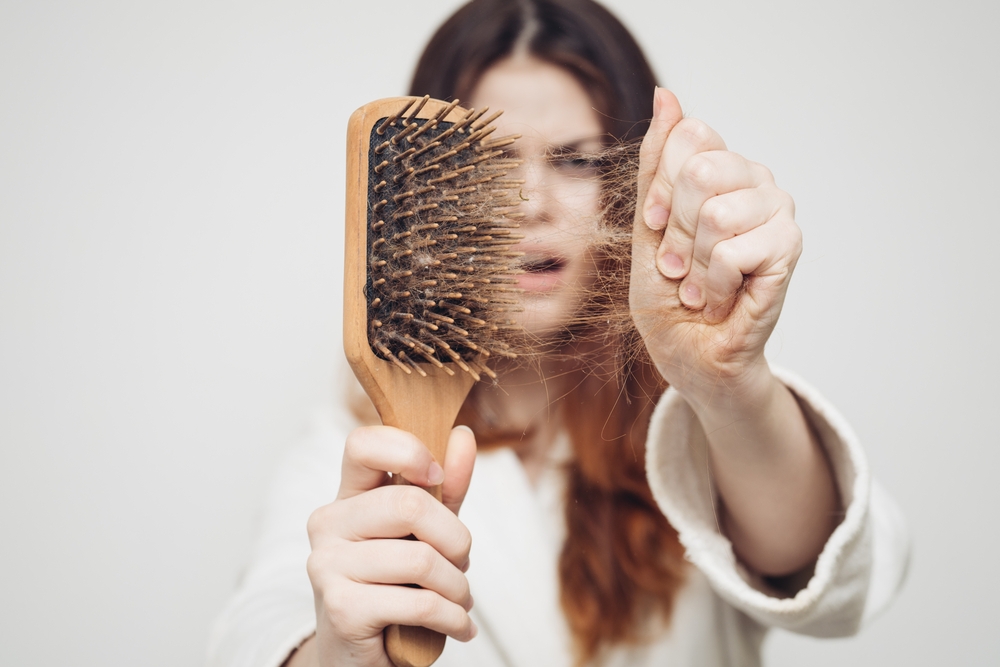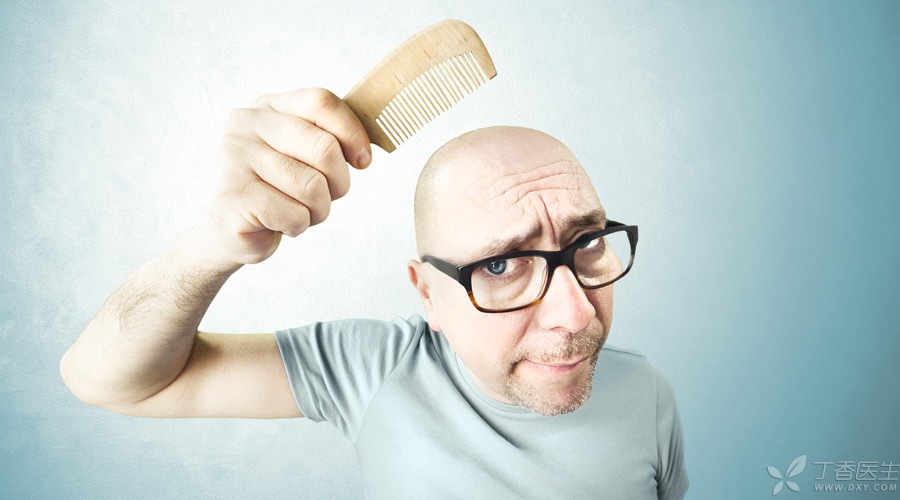
I don’t know if you have seen such a piece of news:
I’m not lying to you! The hair line moves backward by 1cm, and the color value drops by 20 points!
It’s over, it’s over…
My mother said I was barely ten (10) points long, but now my hair has fallen like a runaway horse.
What about the agreed peak of life?
Anxiety, suspicion, inability to look straight at.
Is it a punishment for washing my hair every day?
Or was it too dyed and scalded when you were young?
Is it related to scalp love oil?
Why don’t you have some supplements to make up for it?
Although everyone is so suspicious, after I became a dermatologist, I calmly verified the reason, only to find out that we have too many misunderstandings about alopecia.
Myth 1: Will washing your hair every day lead to alopecia?
Truth: No.
It is normal to lose some hair when washing your hair. Shampoo itself will not cause more hair loss, it just makes those hair that have been laid off leave the scalp.
However, this only means that washing your hair will not lead to alopecia. It does not mean that you will not lose your hair when washing your hair. The fact is, if you lose your hair seriously, you may lose everything…
For example, when you wash your hair, blow your head and comb your head every day, look down at the hair that falls to the ground. They still seem black and beautiful. Will there be any pain in cutting meat?
1. More than 100 pieces hurt again!
The total number of human hair is over 100,000, and about 0.1% of the hair will be replaced every day. In other words, even normal people may have about 100 hairs per day for [job transfer].
- If you don’t lose more than 100 hairs every day, then rest assured, but the back waves of the Yangtze River push the front waves, and the front waves fall on the beach. If you lose more than 100 hairs every day, or suddenly become more obviously, then you should consider pathological alopecia, which really hurts.
So, why does pathological alopecia occur? Also, these 100… how to count! ?
2. Do you want to count these 100 pieces one by one?
One by one, obsessive-compulsive disorder means no longer alive.
Don’t worry, here is a little skill to help you make a rough evaluation:
- Gently grasp a pinch of hair with your hand, gently pull it, and repeat it 5 ~ 6 times in different parts of the scalp. If only 1-2 hairs fall off at a time, it means that the hair is basically normal, and it is roughly estimated that the number of natural hair loss per day is less than 100. If there are more than 3 at a time, it indicates that there may be more than 100 natural alopecia per day.
Remind everyone that it must be gently grasping and pulling. After all, if you don’t lose your hair and use too much energy, you may mistake yourself for alopecia and scalp pain. If you really lose your hair and pull off many roots for no reason, your heart hurts…
3. What are the causes of pathological alopecia?
There are many reasons for pathological alopecia, mainly including:
- Androgenic alopecia (also called seborrheic alopecia) resting alopecia areata (commonly known as [ghost shaving]) hair plucking addiction cicatricial alopecia
As for which kind of alopecia it is, professional doctors are needed to judge it.

Myth 2: Can ironing and dyeing cause alopecia?
Truth: No.
Regular perm and hair dyeing will neither directly lead to alopecia nor aggravate alopecia.
The head can be broken and the hairstyle should not be disorderly. Dyeing and perming can not only make the whole person look more beautiful, but also reduce the embarrassment caused by sparse hair.
1. Perm: It will not directly cause or aggravate alopecia, but it will damage hair quality.
Perm mainly changes the shape of hair shaft through thermal stimulation, which has no effect on hair follicles and will not directly cause alopecia or aggravate alopecia.
But that doesn’t mean you can burn it casually.
Because perm will cause irreversible damage to hair cutin, as many female friends say:
Oh, my hair is not very hot. It is dry and forked. The quality of my hair is not as good as before. I always break my hair!
What they said is true.
Therefore, although perming will not directly lead to alopecia, it should not be too capricious, and it is better to reduce the frequency of perming as much as possible.
2. Hair dyeing: There is no evidence to prove that it will cause alopecia, but it will cause skin allergy.
Hair dyes contain pigments and auxiliary colorants (such as phenylenediamine), which are the most common active ingredients in hair dyeing, and the discussion on side effects of hair dyeing is mainly focused on it. However, there is no authoritative research to prove that it is related to alopecia.
However, allergic reactions to scalp and facial skin caused by hair dye are very common. In addition, many illegal businesses use inferior hair dye. If used repeatedly, the adverse effects on the body are obvious. Therefore, either do not dye your hair or dye less, or choose a relatively formal organization to dye.

Myth 3: [balding] is a man’s patent?
Truth: No.
Unfortunately, [balding] is a matter of equality between men and women, but it is more common for men.
When it comes to [equal alopecia for men and women], we have to say seborrheic alopecia, also known as androgenic alopecia (male alopecia for short).
- Male: Male baldness is more common in men, mainly manifested by the upward movement of forehead hair line and the later development of baldness on the top of the head. Women: Women will also get it, accounting for more than half of women’s alopecia, mainly manifested as alopecia on the top of the head and forehead, but the hair track will not be affected.
Although androgen is surnamed [male], it is found in both men and women and is related to hair growth. Therefore, smart men and women are likely to be [extremely].
Myth 4: Too much scalp oil will lead to alopecia?
Truth: No.
I really can’t blame the scalp for oil… I don’t believe you see many Indians who don’t lose their hair, and their heads are also sparkling with oil.
You must have such friends around you: scalp is always very oily, and you have to wash it every other day or two. Dandruff is quite obvious in winter and you love to lose your hair.
In fact, the oil from scalp comes from sebaceous glands. The secretion function of sebaceous glands is mainly controlled by androgen (testosterone), but it is also affected by environment, temperature, humidity, etc. For example, hair may be more greasy in summer.
Therefore, in a nutshell, scalp greasiness and alopecia are just a result, [love of oil] and [alopecia] can appear together, one after the other, but they have no relationship [because… so…].
It is suggested that people with greasy scalp should increase the frequency of shampoo and enjoy the freshness you deserve.
In addition, it should be emphasized that the normal use of shampoo or conditioner will not affect the growth of hair follicles and will not lead to alopecia. As long as the product is qualified, it is good to use it safely.

Myth 5: Can eat more black sesame and walnuts [grow hair]?
Truth: No.
Want to rely on [food supplement] to grow hair? Don’t even think about it…
To answer this question, we have to look at two aspects:
- If it is pathological alopecia, it must be treated regularly to have a certain effect. Eating anything can only be an aid, and whether it is useful or not depends on the circumstances. If it is physiological alopecia, maybe wait a minute, reduce pressure and you will feel better. What you want to eat to promote hair growth is just a good wish, and whether it is useful or not depends on the fate.
Therefore, people with alopecia only need normal diet and standardized treatment. The so-called [magic food] cannot help.
It doesn’t matter if you have to eat a little, but don’t just eat these.
With vegetables, meat, eggs and milk, a balanced diet can provide sufficient nutrition for hair.
Hair loss is a seemingly simple phenomenon, but many people know little about it and misunderstand it too deeply.
Correctly understand and standardize treatment, perhaps hair will grow out inadvertently!
